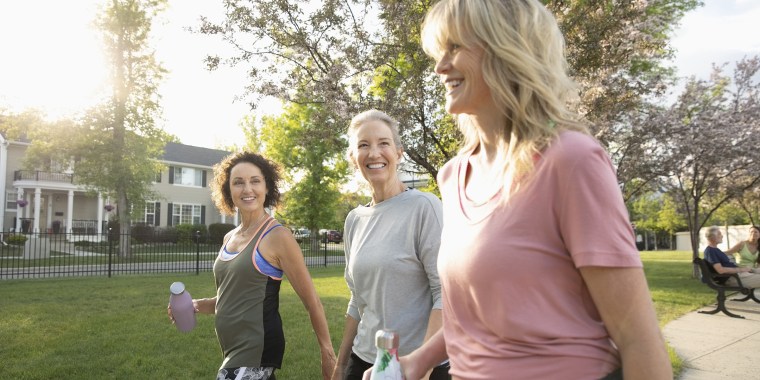Keep walking, running or pedaling for good health: The American Cancer Society is recommending a much higher dose of exercise to prevent cancer.
It’s also putting more emphasis on skipping alcohol, red and processed meats, sugary drinks and highly processed foods.
The organization essentially doubled its previous physical activity recommendations in its new guidelines, published Tuesday in CA: A Cancer Journal for Clinicians, advising adults to get 150-300 minutes of moderate-intensity exercise or 75-150 minutes of vigorous physical activity per week.
The previous guidelines, published in 2012, stopped at “at least” 150 minutes or 75 minutes, respectively.
Exceeding that 300-minute goal is even better and optimal, said Dr. Laura Makaroff, senior vice president of prevention and early detection at the American Cancer Society.
“That is getting a lot of attention,” Makaroff told TODAY. “That really reflects the consensus of science and statements from several different leading cancer organizations around the world that the physical activity piece is key for cancer prevention and helps with maintaining a healthy body weight.”
Taken together, risk factors such as being overweight, staying inactive, eating an unhealthy diet and drinking alcohol, account for almost 1 in 5 cancer cases in the U.S. and almost 16% of cancer deaths, the new report noted.
Aerobic activity that gets the heart pumping appears to have the most benefit when it comes to cancer prevention. Moderate-intensity exercise includes brisk walking, heavy housework and gardening, or even yoga or Pilates, Makaroff said. Vigorous-intensity exercise includes running, fast bicycling and other activities that leave people more breathless.
Simply reducing sitting time may also be important for cancer prevention. What does that mean for people who were sedentary during months of quarantine? They can “absolutely” turn it around, Makaroff noted.
“We do know a lot of people have had a hard time even meeting the 150 minutes a week, so 300 minutes could be more of a challenge,” she said.
“It’s not too late. Starting slow and working up is great… just start walking. Walk in your neighborhood or on a treadmill.”
If 300 minutes feels like a stretch, make 150 minutes your goal for now, she advised.
The greatest risk reduction comes when a person transitions from sitting all day to any amount of aerobic exercise, so the message is “move more and sit less,” the guidelines noted. Taking short activity breaks from sitting, even if it’s just for one minute, can provide health benefits if done regularly, previous research has found.
More tips to reduce cancer risk:
The American Cancer Society had these recommendations
Follow a healthy eating pattern that includes foods high in nutrients: That means a variety of vegetables — including dark green, red and orange foods; fiber-rich legumes like beans and peas — fruits, especially whole fruits with a variety of colors; and whole grains. The Mediterranean diet and the DASH diet fit this profile. Dietary patterns are important to reduce the risk of cancer and improve health, Makaroff noted.
Eat whole foods: Fresh vegetables and fruits are complex and contain vitamins, minerals, fiber, carotenoids, flavonoids and other bioactive substances that may help prevent cancer, the guidelines advised. The American Cancer Society does not recommend dietary supplements for cancer prevention.
Limit or skip red and processed meats: In 2015, the International Agency for Research on Cancer, part of the World Health Organization, classified red meat as “probably carcinogenic to humans” and processed meat as carcinogenic. Also limit or skip sugar-sweetened beverages and highly processed foods and refined grain products.
Skip alcohol: “No alcohol is best,” Makaroff said. If you do choose to imbibe, limit your consumption to no more than one drink per day for women and two drinks per day for men. Some experts say modest drinking is associated with longevity in general. But evidence shows any amount of alcohol increases risk of some types of cancer, most notably breast cancer, the new guidelines warned.
Cancer prevention efforts should also involve community action to support people making good choices, Makaroff said. The goal is to increase access to affordable, nutritious foods; provide safe, enjoyable and accessible opportunities for exercise; and limit alcohol for everyone, the report noted.

